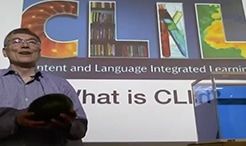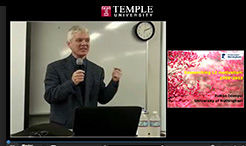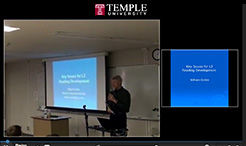Watch the first three hours of each seminar video by answering the survey!

- Professor: Dr. Mike Bostwick (Katoh Gakuen English Immersion, Japan)
- Topic: Theory and Practice of Content & Language Integrated Learning (CLIL)
- Date: Saturday, November 16 (2019)
- Location: TUJ Tokyo Center
The role of content – how much does it belong in the foreign language class and how it should be integrated with language learning outcomes to promote language learning has been a debate since the 1980’s (Pally, 1999). Since this time an extensive body of research has demonstrated that, “content-based instruction (CBI) is typically more effective than ‘text-based’ instruction across a wide range of L2 instructional contexts.” (Brinton, et al., 2006, p 2).
Like CBI, Content and language integrated learning (CLIL) is the integration of particular content with language teaching aims. It is an innovative, instructional approach in which an “additional language” is interwoven with content to promote second language acquisition. It is based on the principle that successful language learning occurs when students are presented with target language material in meaningful, contextualized forms with the primary focus on acquiring information and knowledge. Content is the organizing principle, and other aspects of language (linguistic structures, vocabulary, language functions) are presented as needed (Snow et al., 1989). The approach can be used with second language learners from elementary school through university.
CLIL is a multifaceted and complex approach to teaching foreign languages. The goal of the seminar is to clarify some of these complexities and identify key features of this approach. Participants in the seminar will not only explore the theoretical underpinnings of CLIL they will also learn 15 ‘high impact’ instructional strategies used in highly effective CBI/CLIL programs that can also be applied across a wide range of foreign language teaching contexts.

- Professor: Dr. Zoltán Dörnyei (University of Nottingham, U.K.)
- Topic: Language Learning Motivation and Its Assessment
- Date: Saturday, April 4 (2015)
- Location: TUJ Tokyo Center
Motivation is widely seen both by practitioners and researchers as one of the key factors that determine the success of the acquisition of a foreign/second (L2) language, and therefore L2 motivation research has a rich history of over fifty years within the study of second language acquisition. The seminar offered an overview of the development of this research tradition while also focusing on how the various emerging phases of L2 motivation research have been linked to specific educational concerns and research methodologies.
The opening lecture offered an outline of motivational evolution from the initial social psychological perspective of the 1960-80s, through the educational approaches of the 1990s, to the current self-based and dynamic system approaches. Besides explained the key underlying assumptions and principles, special emphasis was placed on discussing the practical implications of the various motivational paradigms. The rest of the seminar explored the contemporary directions in detail and will also offer an in-depth analysis of critical measurement issues. Key topics included the “L2 motivational Self System”, “motivation as vision”, “motivational dynamics” and “directed motivational currents”. In terms of assessment, first the lecturer summarized the use of questionnaire surveys and then discussed the challenges of conducting motivation research in a dynamic systems vein.

- Professor: Dr. William Grabe (Northern Arizona University, U.S.A.)
- Topic: L2 Reading: Moving from Theory to Practice
- Date: Saturday, May 18 and Sunday, May 19 (2013)
- Location: TUJ Tokyo Center
This seminar on L2 reading covered four major sections: (1) foundations of L2 reading: topics included the nature of reading comprehension, cognitive processes in reading, component skills for reading comprehension, L1 vs. L2 reading, reading motivation, implications for L2 reading instruction, (2) main idea reading comprehension: topics included the roles of vocabulary, grammar, and main idea identification, (3) academic reading skills: topics included becoming a strategic reader, the role of discourse structure awareness, Reading/writing relationships, and (4) the development of the fluent reader: topics included reading fluency, extensive reading, teaching for motivation. There was a short commentary section on additional topics: role of teacher training, reading assessment, technology, neurolinguistic concepts, curricular perspectives. This seminar also asked participants to engage in a number of practical activities in order to reflect on specific instructional options.
The entire seminar was held for two days; Saturday, May 18 between 14:00 - 21:00 and Sunday, May 19 between 10:00 - 17:00. You can watch the first 3 hours (14:00 - 17:00) of the lecture on Saturday, May 18 on the video.
How to watch the videos
Please submit the survey form below to receive the link to watch the selected video.
Note: If you are having trouble completing this form, try opening the form in a new window .
Note: If you are having trouble completing this form, try opening the form in a new window .
